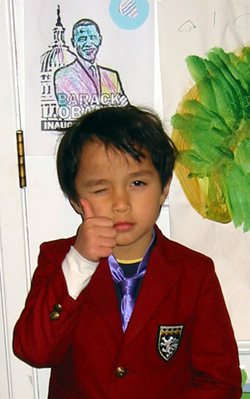The 'Asian fail' and having fun with the model-minority myth and other stereotypes

My son, Little Brother, looking learned and cool in his "Perfesser suit" on the day of President Obama's inauguration.
Frances Kai-Hwa Wang | Contributor
He then turned to the kids and said, “You do not have to get good grades or go to a good college, you just have to learn how to be a good person and be happy.”
The children and I stared at him, mouths dropped open in disbelief, “Who are you and what have you done with my real father?”
The joke around our house whenever exams come back has always been, “WHAT? ONLY 103%? Why not 106%?!!!”
Some of the children’s friends joke about the shame of getting an “Asian fail” (A-) on exams.
I have always joked about how I am “a bad Asian” because I cannot do math.
Because our family knows the Asian American model-minority myth is indeed a myth and a stereotype, we have a lot of fun with it, especially as we slide through finals week here. One daughter even uses it to her advantage in school, pretending she is nerdier than she really is. I smilingly threaten another daughter by telling her how much I will enjoy having her live at home for a few extra years if she cannot get herself into a good out-of-state college. (She finally starts studying.)
I worry, however, when others do not realize that they are dealing in stereotypes. Will those children get the help they need if they struggle in math? Will they be sufficiently challenged in language arts? Will they think something is wrong with them for not fitting whatever stereotype is applied to them? Will they be penalized for seeing the world differently? Will others see only the stereotype in spite of the real person before them?
When I was in high school, Newsweek published an article about how Asian Americans were the model minority — naturally good at math and science, not good leaders. I was so naïve that I thought if it had been published, it must be true. My father looked at me and said, “China has a 4,000-year history. Who do you think was leading it?” I later learned that it was the result of U.S. Immigration policy that so many highly educated scientists and engineers immigrated after 1965.
Unlike George Clooney’s character in Up in the Air, who rationalizes: “I stereotype because it’s faster,” I did not even realize the model-minority myth was a stereotype. I had to learn all the stereotypes before I could figure out how to compensate for them (without simply reacting to them).
Luckily, we live in Ann Arbor, where it is OK to be smart, where the schools are concerned about the persistent achievement gap, where people understand the importance of multiculturalism and tolerance, where there is enough diversity for my children to find friends who get them and get their jokes.
When Barack Obama was inaugurated, the University of Michigan Children’s Center held an Inaugural Ball. As I straightened Little Brother’s tie — his first time ever wearing a coat and tie — he admired his outfit in the upright mirror and said, “I look like a perfesser.” Only in Ann Arbor would a 5-year-old child think a suit coat made him look like a professor rather than, say, a businessman or a banker … and I smiled.
Frances Kai-Hwa Wang is a second-generation Chinese American from California who now divides her time between Ann Arbor and the Big Island of Hawaii. She is editor of IMDiversity.com Asian American Village, lead multicultural contributor for AnnArbor.com, and a contributor for New America Media's Ethnoblog. She is a popular speaker on Asian Pacific American and multicultural issues. Check out her website at franceskaihwawang.com, her blog at franceskaihwawang.blogspot.com, and she can be reached at fkwang888@gmail.com.

